#indigenous American languages
Text
ECHO poster in sign language!

#echo#alaqua cox#maya lopez#disney+#mcu#indigenous#native american#american sign language#sign language#deaf#representation matters
448 notes
·
View notes
Text

The demo is free! Check it out and consider donating!
#ojibwe#indigenous#ojibwe language#reclaim!#anishinaabe#anishinaabemowin#video games#ojibwemowin#ojibway#native american#native#language revitalization#indigenous languages#ndn#ndn tag#n8v#language#indigenous art#language learning#signal boost
186 notes
·
View notes
Text
Chitimacha
Chitimacha is a Native American language of Louisiana that was spoken until the death of its last two native speakers, Ben (1934) & Delphine (1940), pictured here.
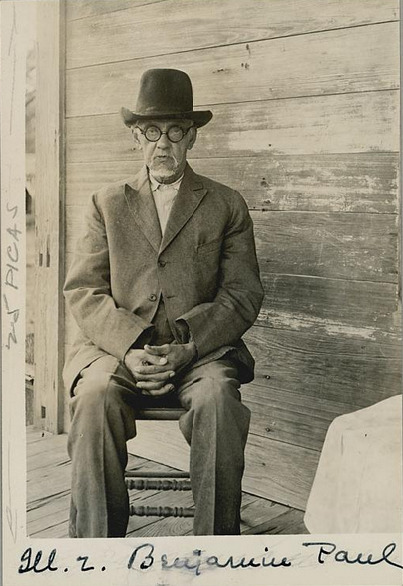
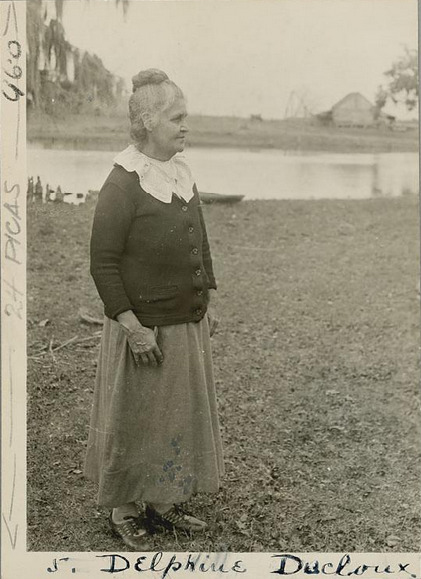
Thankfully, a linguist named Morris Swadesh (pictured) worked with Ben & Delphine to write down 120 Chitimacha stories and create a basic dictionary before they died.

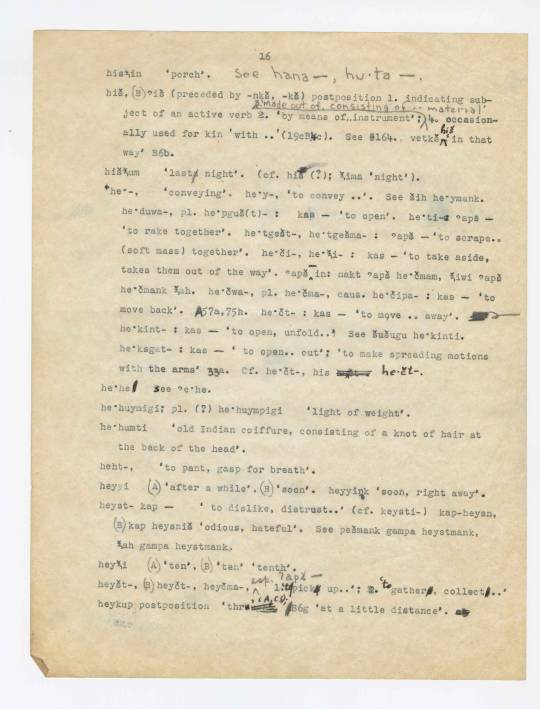
Today, the Chitimacha tribe is revitalizing their language using those archival materials. They’ve created Rosetta Stone language learning software for Chitimacha, have daily language and culture classes in the tribal school, and have put up bilingual English-Chitimacha signs in many places.
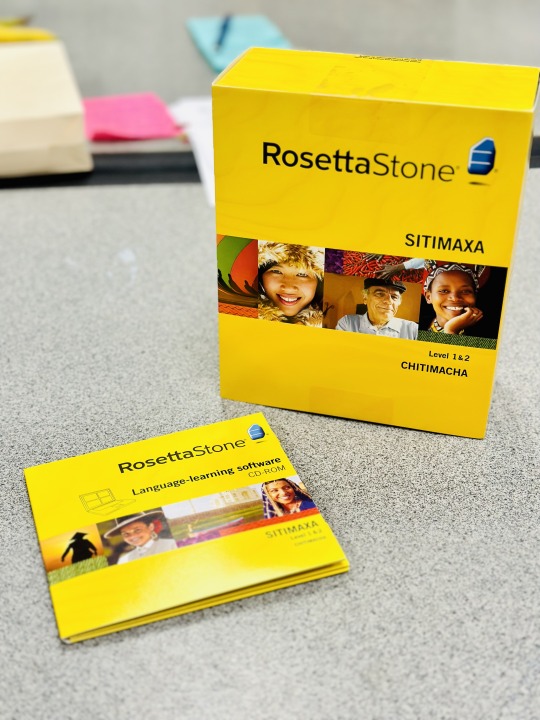
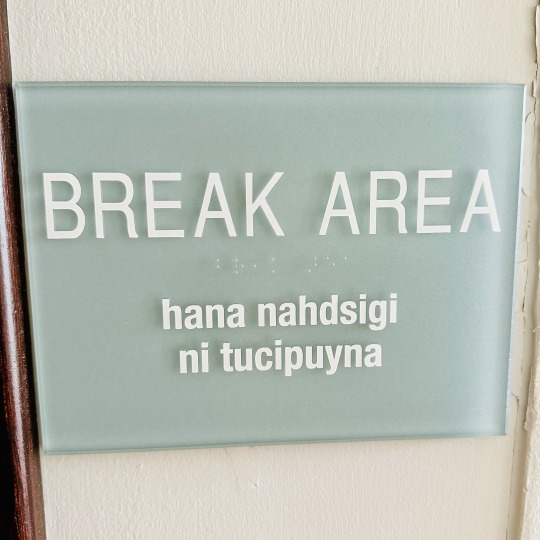

Last week, I visited the Chitimacha reservation to run a workshop for the language teachers. We practiced many different pronunciation and grammar details, but also coined many new words! Here are a few we came up with:
Neymank Waxta ‘Indigenous Peoples Day’ (literally ‘people of the land’s day')
gaspam ‘refrigerator’ (literally ‘thing that causes it to be cold’)
pexpa patsi ‘volleyball’ = pexpa ‘cause to fly’ + patsi ‘ball’
huuta qapx kudihn ‘kayak’ (literally ‘boat closed in on itself’)
Chitimacha has a unique spelling system:
⟨b, d, g, dz, j⟩ are ejective consonants /pʼ, tʼ, kʼ, t͡sʼ, t͡ʃʼ/
⟨q⟩ is a glottal stop /ʔ/
⟨x⟩ is the palato-alveolar fricative /ʃ/
You can read more about the Chitimacha language in my forthcoming book chapter, available here:
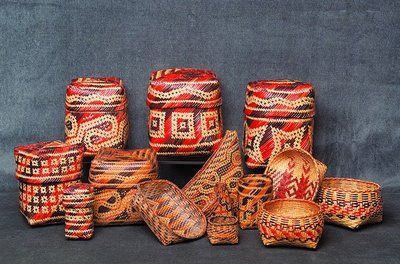
431 notes
·
View notes
Text
youtube
Centuries before we had American Sign Language, Native sign languages, broadly known as “Hand Talk,” were thriving across North America. Hand Talk would be influential in the formation of American Sign Language. But it has largely been written out of history.
One of these Hand Talk variations, Plains Indian Sign Language, was used so widely across the Great Plains that it became a lingua franca — a universal language used by both deaf and hearing people to communicate among tribes that didn’t share a common spoken language. At one point, tens of thousands of indigenous people used Plains Indian Sign Language, or PISL, for everything from trade to hunting, conflict, storytelling, and rituals.
But by the late 1800s, the federal government had implemented a policy that would change the course of indigenous history forever: a violent boarding school program designed to forcibly assimilate indigenous children into white American culture — a dark history that we’re still learning more about to this day. Because of a forced “English-only” policy, the boarding school era is one of the main reasons we lost so many Native signers — along with the eventual dominance of ASL in schools for the deaf.
Today, there are just a handful of fluent PISL signers left in the US. In the piece above we hear from two of these signers who have dedicated their lives to studying and revitalizing the language. They show us PISL in action, and help us explore how this ancient language holds centuries of indigenous history.
Read more from Melanie McKay-Cody on the history of Plains Indian Sign Language: https://shareok.org/handle/11244/319767
Check out Lanny Real Bird’s videos: / @lannyrealbird9015
Much of the footage of the 1930 Indian Sign Language Council isn’t online, but check out some of it here: https://commons.wikimedia.org/wiki/Fi...
Here are some original books we reference on sign talk: https://archive.org/details/indiansig...https://archive.org/details/indiansig...
The Smithsonian holds lots of photos and archives on Plains Indian Sign Language like this: https://www.si.edu/object/archives/co...
Sarah Klotz on how Native American boarding schools like Carlisle contributed to the loss of PISL: http://constell8cr.com/issue-2/the-hi.... She references archives that shows how students continued to use sign language like this one from the Carlisle Indian School Digital Resource Center: https://carlisleindian.dickinson.edu/...
#indigenous#native american#ndn#hand talk#asl#sign language#pisl#plains indian sign language#linguistics#boarding schools#indian boarding schools#Youtube
163 notes
·
View notes
Text
every time i see someone say that we should erase all other languages and make english the 'universal language' I'm reminded how ignorant and culturally insensitive some people are. to not be aware of the historical and cultural significance of a language in most cultures is bizarre. in erasing a language you would thus be erasing years of important history of a culture. i hope these people educate themselves before speaking on something they know nothing about simply because it would 'make their lives easier'. not to mention its so tone-deaf to the people who are fighting for language revitalization due to the historical language suppression of their ancestors.
#language#rant#linguistics#culture#history#langblr#native american languages#gaelic#ainu#language revitalization#endangered languages#indigenous#indigenous languages
879 notes
·
View notes
Text
Something new for Native American Heritage Month this year:
This playlist features indigenous musicians from North, Central, and South America. It includes a variety of genres (post-classical composers, folk punk, indie pop, pow wow punk rock (yes, that's a thing!), indie rock, etc.), as well as a variety of languages (Wolastoqey, Inuktitut, Atikamekw, Cherokee, Navajo, Cree, Quechua, Greenlandic (Kalaallisut), Tłı̨chǫ, English, French, and Spanish).
#indigenous#music#native american#first nations#inuit#métis#native american heritage month#language revitalization#folk#punk#indie#itskindofme#still working on adding more from central & south america#okay I guess it only allows 100 songs in the preview thing... but there are more than 100 songs
72 notes
·
View notes
Text

I fucking hate this post. 'no matter the genre or setting it's probably from hollywood' the rest of the world (and non-mainstream american creators) make tv and film and write stories too and you'd probably know that if you bothered to pull your head put of your ass and look outside your little mainstream bubble you fucking idiot.
#honestly yeah a lot of my film and tv is american too but this post pisses me off so bad bc it's just assuming that american#tv and movies are univsersa#'no matter the genre' show me an american wuxia film then.#actually im looking at my letterboxd and that might not even be true#even in the english language sphere the british film industry is huge ntm japan korea france mexico china india....#egypt! palestine! russia! kenya! broaden your fucking horizons! I'm in despair#oh australia. even independent us filmmakers! and films from indigenous creators!#cor.txt
11 notes
·
View notes
Note
Ok I know this doesn’t make it incredibly easier but what American (indigenous north and south) language would be the best with kana
gimme a sec i gotta look up some kana facts
...ok, i know cherokee is rocking it with their own syllabary (shoutout to the legend sequoyah!!), but the simple fact that it works well with a syllabary makes it a good baseline candidate. however they would have to reassign some phonemes.
#i don't have the spoons to dig deeper and compare phoneme inventories with syllable shapes etc.#because y'all there are a lot of indigenous american languages
34 notes
·
View notes
Text
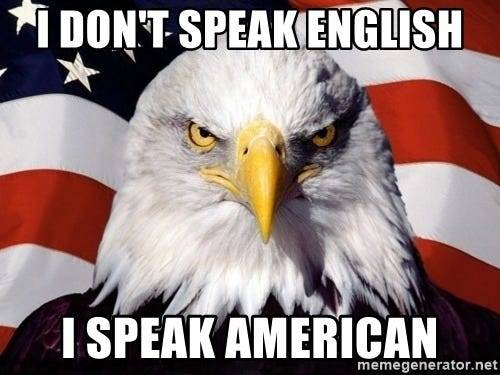
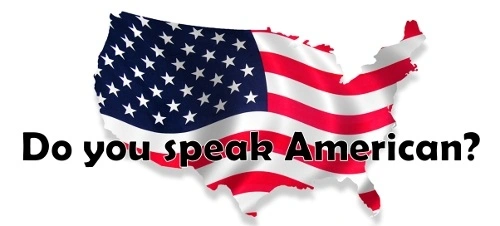
English is a West Germanic language that originated from Ingvaeonic languages brought to Britain in the mid-5th to 7th centuries AD by Anglo-Saxon migrants from what is now northwest Germany, southern Denmark and the Netherlands.
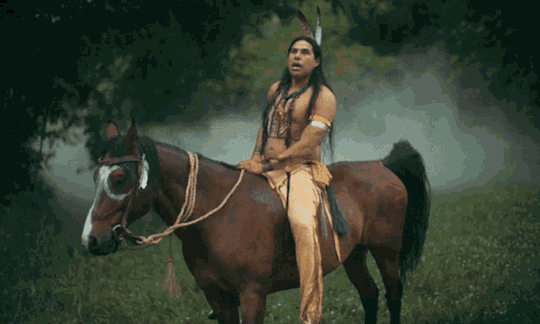
In other words,English is a European language. American languages are The Indigenous languages of the Americas are the languages that were used by the Indigenous peoples of the Americas before the arrival of non-Indigenous peoples. Over a thousand of these languages are still used today
The most widely spoken Indigenous languages are Southern Quechua (spoken primarily in southern Peru and Bolivia) and Guarani (centered in Paraguay, where it shares national language status with Spanish), with perhaps six or seven million speakers apiece (including many of European descent in the case of Guarani). Only half a dozen others have more than a million speakers; these are Aymara of Bolivia and Nahuatl of Mexico, with almost two million each; the Mayan languages Kekchi, Quiché, and Yucatec of Guatemala and Mexico, with about 1 million apiece; and perhaps one or two additional Quechuan languages in Peru and Ecuador. In the United States, 372,000 people reported speaking an Indigenous language at home in the 2010 census. In Canada, 133,000 people reported speaking an Indigenous language at home in the 2011 census. In Greenland, about 90% of the population speaks Greenlandic, the most widely spoken Eskaleut language.
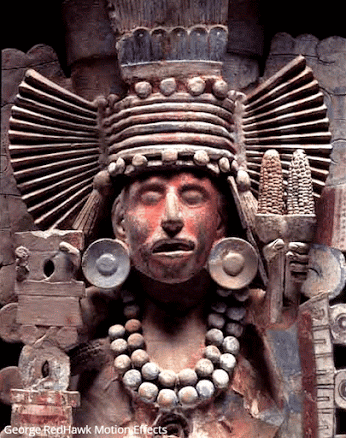
#kemetic dreams#brownskin#brown skin#asians#asian#native american#native#native girls#nativebaddiez#nativeamericans#nativebigtitt#ndn#native women#navajo#first nations#indigenous#nahuatl#indigenous languages#Kekchi#Aymara#Eskaleut#Yucatec
21 notes
·
View notes
Photo

Indigenous Languages of the Americas with more than 25,000 Speakers
by u/Aofen
180 notes
·
View notes
Text

#short story collection#short story collections#nameless woman#nameless woman: an anthology of fiction by trans women of color#ellyn peña#jamie berrout#various authors#venus selenite#21st century literature#english language literature#american literature#african american literature#black literature#latino american literature#indigenous literature#have you read this short fiction?#book polls#completed polls
20 notes
·
View notes
Text
hey! if youre in oklahoma, you should check out the 20th anniversary exhibit about the oklahoma native american youth language fair! opening tomorrow and running til the end of october at the sam noble museum in norman!
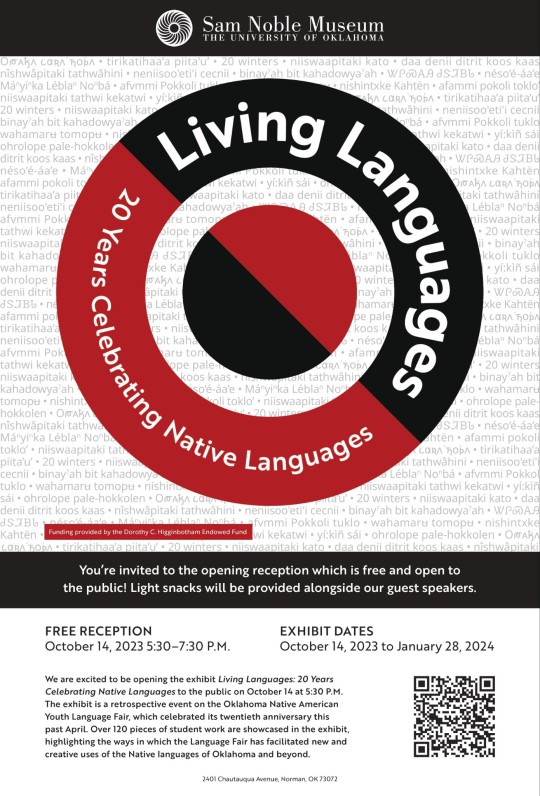
its not being advertised by the museum afaik but my native studies program sent us info about it so i thought id share :)
#oklahoma#native language#language revitalization#native american#indigenous#anompolili#ill be in OK shortly next week for medical stuff so i might try and swing by if i have time#hatuk upi homma
33 notes
·
View notes
Text
Indigenous vs. European perspectives on etymology: pumpkin
There are two theories about the origin of the word pumpkin, which represent two very different perspectives on history:
All major dictionaries say that the most likely origin for pumpkin is the French word pompion ‘melon’ + the English diminutive suffix -kin ‘little’.
The Wampanoag tribe of Massachusetts says that pumpkin comes from its word pôhpukun ‘pumpkin’, but literally meaning ‘it grows forth round’.
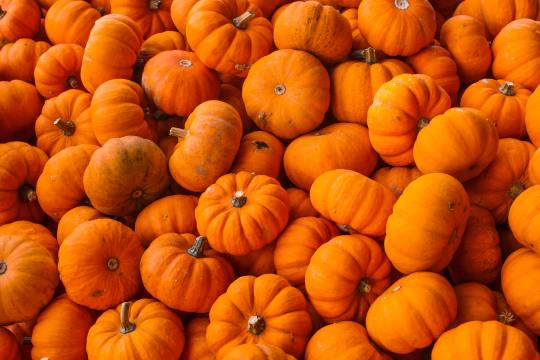
The Plymouth settlers borrowed lots of words from the local Wampanoag people, including moccasin, skunk, squash, and the name of the state, Massachusetts. Tisquantum (who history knows as Squanto) taught them a great deal about local plants and wildlife, so it stands to reason they would have also learned the word pumpkin from him, butchering the pronunciation in the process.
But the way they butchered the pronunciation is important. When English speakers heard the word pôhpukun without realizing it was an Algonquian word, they thought it was actually based on English or French. To them, it sounded like pompion with the -kin suffix added to it. The word pompion (or some similar version of it) appears in English documents in North America prior to the settlement of Plymouth, so it’s likely the Pilgrims were familiar with the word (but probably not strongly so, given that the word was only borrowed into English 80 years prior). As a result, they misanalyzed pôhpukun as pumpkin, thinking it was a combination of the French word pompion and the English suffix -kin.
This kind of misanalysis is called a folk etymology. Other examples are cockroach (< Spanish cucaracha) and woodchuck (< Cree otchek). Folk etymologies happen when speakers analyze a word as having different parts than it actually does.
In this particular case, it seems that the folk etymology is the one that made it into the dictionary, rather than the original Native American one.
#pumpkin#etymology#linguistics#language#Indigenous#Native#Native American#Native American Heritage Month#Thanksgiving#lingblr#langblr
385 notes
·
View notes
Text
#indigenous#native american#ndn#good news#Anishinaabemowin#Ojibway#indigenous languages#languages#language#language revitalization#indigenous issues#canada
44 notes
·
View notes
Text
the longer i work in public defense the less patience i have for people in this system who derail important conversations about our clients based on how PC our language is
#like im sorry#but my 65 year old schizophrenic client who lives in a tent is NEVER going to describe himself as neurodivergent & unhoused lolll#i always use the client's own words - if a client calls themselves homeless & bipolar that is what i am going to call them in court#if a client calls themselves American Indian instead of Indigenous then i am gonna call them American Indian on the record#it is suchhhh a waste of time when people in court ask us to make our language more palatable#like bitch this is a person's self-described identity#it's seriously just to make these white savior progressive prosecutors feel better i swear#anyways. rant over#i was in court today if u cant tell
6 notes
·
View notes
Text

Doctor Sleep (2019, Mike Flanagan)
18/04/2024
#doctor sleep#2019#mike flanagan#the shining#stephen king#ewan mcgregor#danny torrance#Sequel#stanley kubrick#1980#top hat#colorado#2011#new hampshire#alcoholics anonymous#baseball#Indigenous peoples of the Americans#slate#Iowa#telepathy#Baseball glove#jack torrance#Femoral artery#Symphonie fantastique#hector berlioz#United States dollar#rotten tomatoes#metacritic#english language#united states
12 notes
·
View notes